Module 2 My home town and my country模块复习课件
文档属性
| 名称 | Module 2 My home town and my country模块复习课件 |  | |
| 格式 | zip | ||
| 文件大小 | 5.0MB | ||
| 资源类型 | 教案 | ||
| 版本资源 | 外研版 | ||
| 科目 | 英语 | ||
| 更新时间 | 2022-08-02 11:09:54 | ||
图片预览

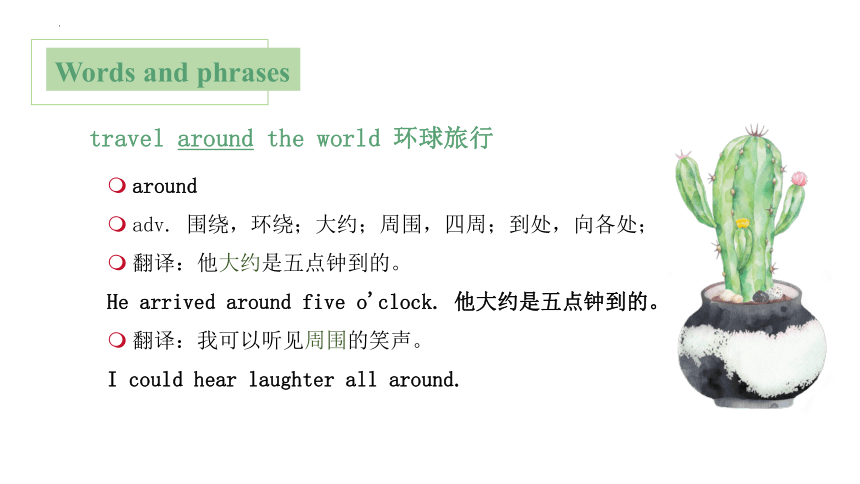
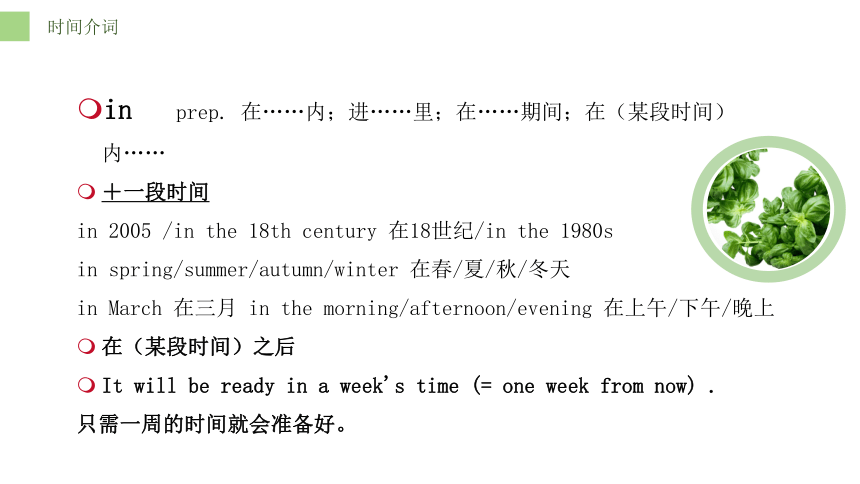
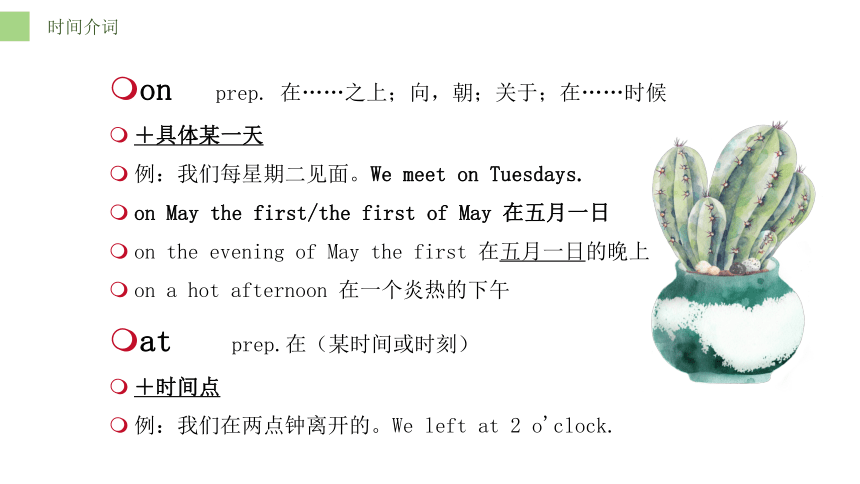
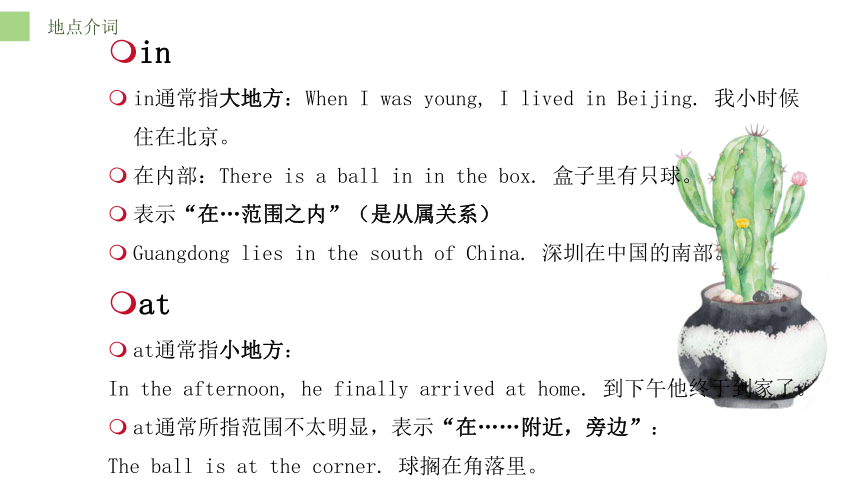
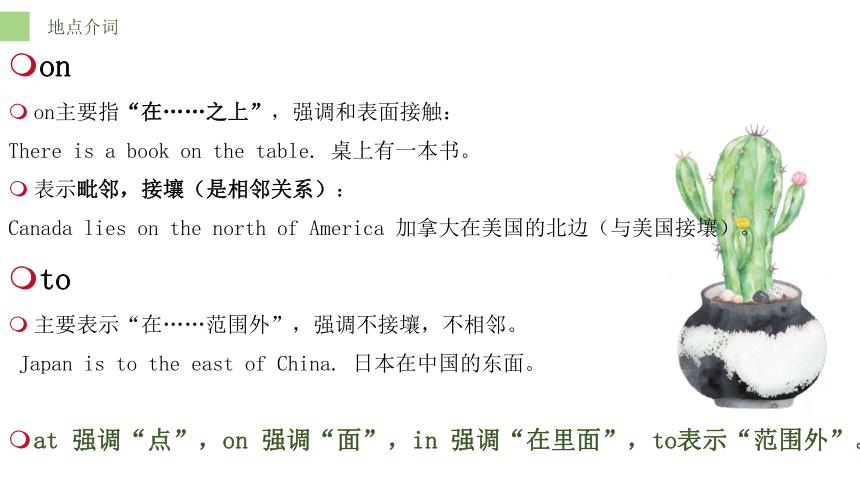
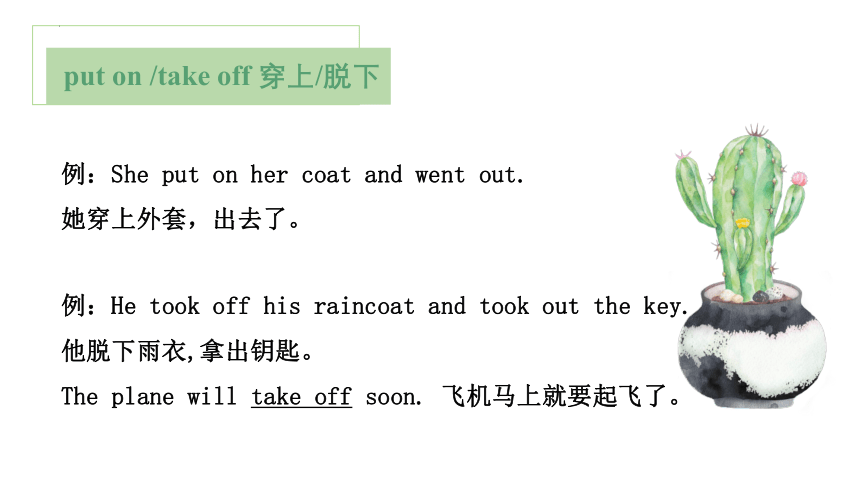
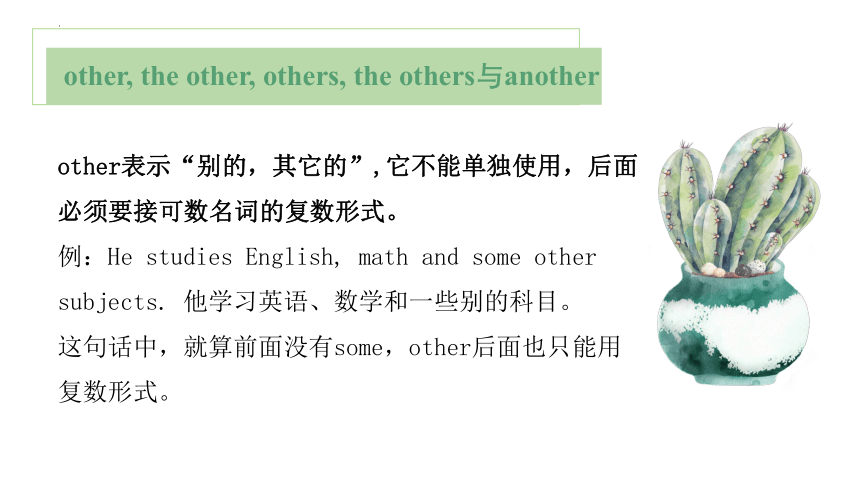
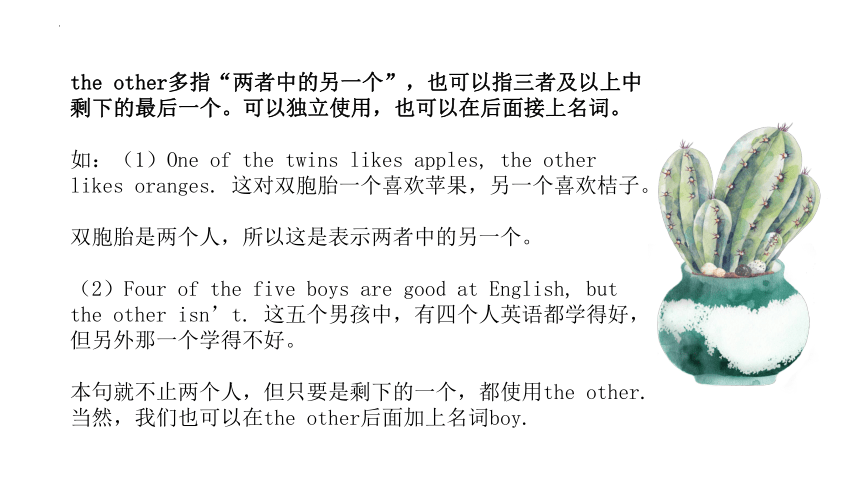
文档简介
(共27张PPT)
Module 2
Words and phrases
travel around the world 环球旅行
around
adv. 围绕,环绕;大约;周围,四周;到处,向各处;
翻译:他大约是五点钟到的。
He arrived around five o'clock. 他大约是五点钟到的。
翻译:我可以听见周围的笑声。
I could hear laughter all around.
in prep. 在……内;进……里;在……期间;在(某段时间)内……
+一段时间
in 2005 /in the 18th century 在18世纪/in the 1980s
in spring/summer/autumn/winter 在春/夏/秋/冬天
in March 在三月 in the morning/afternoon/evening 在上午/下午/晚上
在(某段时间)之后
It will be ready in a week's time (= one week from now) .
只需一周的时间就会准备好。
时间介词
on prep. 在……之上;向,朝;关于;在……时候
+具体某一天
例:我们每星期二见面。We meet on Tuesdays.
on May the first/the first of May 在五月一日
on the evening of May the first 在五月一日的晚上
on a hot afternoon 在一个炎热的下午
at prep.在(某时间或时刻)
+时间点
例:我们在两点钟离开的。We left at 2 o'clock.
时间介词
in
in通常指大地方:When I was young, I lived in Beijing. 我小时候住在北京。
在内部:There is a ball in in the box. 盒子里有只球。
表示“在…范围之内”(是从属关系)
Guangdong lies in the south of China. 深圳在中国的南部。
at
at通常指小地方:
In the afternoon, he finally arrived at home. 到下午他终于到家了。
at通常所指范围不太明显,表示“在……附近,旁边”:
The ball is at the corner. 球搁在角落里。
地点介词
on
on主要指“在……之上”,强调和表面接触:
There is a book on the table. 桌上有一本书。
表示毗邻,接壤(是相邻关系):
Canada lies on the north of America 加拿大在美国的北边(与美国接壤)。
to
主要表示“在……范围外”,强调不接壤,不相邻。
Japan is to the east of China. 日本在中国的东面。
at 强调“点”,on 强调“面”,in 强调“在里面”,to表示“范围外”。
地点介词
put on /take off 穿上/脱下
例:She put on her coat and went out.
她穿上外套,出去了。
例:He took off his raincoat and took out the key. 他脱下雨衣,拿出钥匙。
The plane will take off soon. 飞机马上就要起飞了。
other, the other, others, the others与another
other表示“别的,其它的”,它不能单独使用,后面必须要接可数名词的复数形式。
例:He studies English, math and some other subjects. 他学习英语、数学和一些别的科目。
这句话中,就算前面没有some,other后面也只能用复数形式。
the other多指“两者中的另一个”,也可以指三者及以上中剩下的最后一个。可以独立使用,也可以在后面接上名词。
如:(1)One of the twins likes apples, the other likes oranges. 这对双胞胎一个喜欢苹果,另一个喜欢桔子。
双胞胎是两个人,所以这是表示两者中的另一个。
(2)Four of the five boys are good at English, but the other isn’t. 这五个男孩中,有四个人英语都学得好,但另外那一个学得不好。
本句就不止两个人,但只要是剩下的一个,都使用the other. 当然,我们也可以在the other后面加上名词boy.
others 表复数,泛指“别人;别的东西”,它就相当于other+名词复数,因此它的后面不能再接名词。如果句中前面出现了some,后面通常就会用others,即构成“Some…others…”的结构, 这时也可以翻译成“有的……有的……”。
如:(1)Some students are dancing, others are singing. 一些学生在跳舞,其他的在唱歌。
这句话也可以翻译成“学生们有的在跳舞,有的在唱歌”。Others就相当于other students.
(2)Tom likes helping others. 汤姆喜欢帮助别人。
the others 也表复数, 特指“别人;别的东西”,它相当于the other+名词复数,它后面不接名词。
Others是泛指,而the others是特指,怎么理解呢?如果排除一个不确定的数量,剩下的就用others,如上面的some students, some就是一个不确定的数量,所以剩下的数量也就不确定了,于是就用others来泛指。如果排除一个确定的数量,剩下的就应该用the others来特指。
如:Five students are dancing, the others are singing. 有五个学生在跳舞,其他的在唱歌。
本句中排除的学生是5个,这是一个确定的数量,于是后面也就用the others 来特指。当然,the others 也可以写成the other students.
another表三者及以上中的“再一,另一”个,后接单数名词。这个单词本来就是“an other”两个单词的连写,所以它的前面不可能再用上冠词an.
如:(1)Have an another cup of coffee, please. 请再喝一杯咖啡。(错误,不能用an)
(2)Have another cup of coffee, please.请再喝一杯咖啡。(正确)
本句中如果用the other来代替another, 那意思就暗含这个主人一共只有两杯咖啡,客人喝了一杯,再请他喝另外的那一杯。意思当然就不对了。
another后还可以接“数词+名词复数”,这时是把“数词+名词复数作为一个整体来看待的。
如:She had to stay here for another ten days。她只好又在这儿呆了十天。
本句的意思暗含她原来就在这里已经住了若干天了,现在不得不又住一个十天。
Language points
It's on the coast near Hong Kong.它在临近香港的海边。
on the+方位词+coast of... “在......的......海岸”
Xiamen is a city on the south coast of China.
厦门是中国南部海岸的一座城市。
In fact, it only became important in the 1980s.
实际上,它到了20世纪80年代才变得重要。
“in the +整十年份+s/’s”意为“在……世纪……年代”。
in the 2010s 在21世纪10年代
I come from Cambridge, a beautiful city in the east of
England. 我来自剑桥,一座位于英格兰东部的美丽城市。
east作名词时,意为“东; 东方”;
作形容词时,意为“在东方的; 朝东的”。
in the east of …意为“在……的东部”,表示在某个范围内的东部。
The road runs east to west.这条路是东西走向的。
Shandong lies in the east of China.山东在中国的东部。
My home town is especially famous for its university.
我的家乡尤其因它的大学而闻名。
be famous for 意为“因……而闻名”,后接闻名的原因。
He is famous for his novels. 他因他的小说而出名。
拓展
be famous as 意为“以……而出名”,后常接身份、职业。
He is famous as a writer.他作为一名作家而出名。
It's getting bigger and busier.它正变得更大,更繁华。
get此处是系动词, 意为“变得,成为”,后接形容词或形容词比较级作表语。
The weather is getting hotter and hotter.天气变得越来越暖和。
收到;得到 I got a lot of presents for my birthday.
拿来 Please get me some water!
到;抵达 He got home at 6 o'clock.
【拓展】get 的其他用法
What's the population of Shenzhen
深圳人口是多少?
population名词,意为“(某一地区的)人口,全体居民”,
作主语时谓语动词用单数。表达人口多用larger或big,人口
少用small。
The popolation of the city is very small. 这个城市人口少。
询问人口用句型:What's the population of+地区?
What’s the population of China 中国有多少人口?
Its streets are much wider and cleaner too.
它的街道也更宽阔更干净。
much此处用作副词,意为“很,十分”,表示程度,
修饰比较级。even, a lot, a little等也可修饰比较级。
Mary's room is much bigger than mine.
玛丽的房间比我的大得多。
My bag is even heavier than yours.
我的包比你的重得多。
Remember to visit the Diwang Tower.
记得去参观地王大厦。
▲remember to do sth.“记得去做某事(事没做)”。
▲remember doing sth.“记得做过某事(事已做)”。
翻译:记得走的时候关门。
Remember to close the door when you leave.
类似用法的词还有:remember记得
forget忘记
regret遗憾
+doing
做过
+to do
没做
02
练习时间
II.根据根据句意和汉语提示写单词。
1. 你认为数学和英语一样难吗
Do you think math is _____ __________ _____ English
2. 重庆有三千多万人口.
Chongqing _____ _____ __________ _____ more than 30, 000, 000.
3. 四川有多少人口
_______ ______ the population of Sichuan
4. 中国的人口很多.
China has _____ _______ ____________.
5. 天黑了, 天气变得更冷了.
It's dark and it is ________ _______.
as difficult as
has a population of
What is
a large population
getting colder
1. 我的家乡因很多美丽的小湖泊而闻名。
My hometown ____ ________ ______ many beautiful
small lakes.
2. 我爸爸通常比我妈妈忙。
My father is usually ______ _____ my mother.
3. 他来自非洲西部的一个小国家.
He comes from a small country ____ ____ ____ of Africa.
4. 他喜欢很多科目, 例如语文、英语和数学.
He likes many subjects, ______ ____ Chinese, English
and math.
is famous for
busier than
in the west
such as
Ⅱ. 完成下列句子。
1 她对做饭感兴趣。
She ________________________ meals.
2 北京比广州繁忙。
Beijing _______________ Guangzhou.
3 这条路比那条路宽。
This road _______________that one. 4 伦敦以泰晤士河而著名。
London __________________ the Thames.
5 长江比泰晤士河长。
The Yangtze River_______________ the Thames.
is interested in cooking
is busier than
is wider than
is more famous for
is longer than
Grammar
构成方法 原级 比较级
单音节和少数双音节 一般在词尾 加-er cold colder
以字母e 结尾的加 -r nice nicer
重读闭音节结尾,且末尾只有一个辅音字母,要先双写这个辅音字母,再加-er big bigger
以辅音字母+y 结尾的, 把 y 改 i , 再加 -er busy busier
形容词比较级的构成
形容词比较级的不规则变化
原级
good / well
many / much
bad / ill
little
old
far
better
比较级
more
worse
less
older / elder
farther / further
1.两者进行比较时
A + be+ 形容词比较级 + than + B。
Mike is older than Tom.迈克比汤姆大。
2. 两者之间选择性比较:
Which/Who +be+形容词比较级,A or B
Who is taller , Tom or Mike 汤姆和迈克谁更高?
3.比较级前可以用much, far, a lot, a little, even, 等来修饰。
He is a little fatter than me.他比我胖一点儿。
形容词比较级的用法
谢谢观赏
Module 2
Words and phrases
travel around the world 环球旅行
around
adv. 围绕,环绕;大约;周围,四周;到处,向各处;
翻译:他大约是五点钟到的。
He arrived around five o'clock. 他大约是五点钟到的。
翻译:我可以听见周围的笑声。
I could hear laughter all around.
in prep. 在……内;进……里;在……期间;在(某段时间)内……
+一段时间
in 2005 /in the 18th century 在18世纪/in the 1980s
in spring/summer/autumn/winter 在春/夏/秋/冬天
in March 在三月 in the morning/afternoon/evening 在上午/下午/晚上
在(某段时间)之后
It will be ready in a week's time (= one week from now) .
只需一周的时间就会准备好。
时间介词
on prep. 在……之上;向,朝;关于;在……时候
+具体某一天
例:我们每星期二见面。We meet on Tuesdays.
on May the first/the first of May 在五月一日
on the evening of May the first 在五月一日的晚上
on a hot afternoon 在一个炎热的下午
at prep.在(某时间或时刻)
+时间点
例:我们在两点钟离开的。We left at 2 o'clock.
时间介词
in
in通常指大地方:When I was young, I lived in Beijing. 我小时候住在北京。
在内部:There is a ball in in the box. 盒子里有只球。
表示“在…范围之内”(是从属关系)
Guangdong lies in the south of China. 深圳在中国的南部。
at
at通常指小地方:
In the afternoon, he finally arrived at home. 到下午他终于到家了。
at通常所指范围不太明显,表示“在……附近,旁边”:
The ball is at the corner. 球搁在角落里。
地点介词
on
on主要指“在……之上”,强调和表面接触:
There is a book on the table. 桌上有一本书。
表示毗邻,接壤(是相邻关系):
Canada lies on the north of America 加拿大在美国的北边(与美国接壤)。
to
主要表示“在……范围外”,强调不接壤,不相邻。
Japan is to the east of China. 日本在中国的东面。
at 强调“点”,on 强调“面”,in 强调“在里面”,to表示“范围外”。
地点介词
put on /take off 穿上/脱下
例:She put on her coat and went out.
她穿上外套,出去了。
例:He took off his raincoat and took out the key. 他脱下雨衣,拿出钥匙。
The plane will take off soon. 飞机马上就要起飞了。
other, the other, others, the others与another
other表示“别的,其它的”,它不能单独使用,后面必须要接可数名词的复数形式。
例:He studies English, math and some other subjects. 他学习英语、数学和一些别的科目。
这句话中,就算前面没有some,other后面也只能用复数形式。
the other多指“两者中的另一个”,也可以指三者及以上中剩下的最后一个。可以独立使用,也可以在后面接上名词。
如:(1)One of the twins likes apples, the other likes oranges. 这对双胞胎一个喜欢苹果,另一个喜欢桔子。
双胞胎是两个人,所以这是表示两者中的另一个。
(2)Four of the five boys are good at English, but the other isn’t. 这五个男孩中,有四个人英语都学得好,但另外那一个学得不好。
本句就不止两个人,但只要是剩下的一个,都使用the other. 当然,我们也可以在the other后面加上名词boy.
others 表复数,泛指“别人;别的东西”,它就相当于other+名词复数,因此它的后面不能再接名词。如果句中前面出现了some,后面通常就会用others,即构成“Some…others…”的结构, 这时也可以翻译成“有的……有的……”。
如:(1)Some students are dancing, others are singing. 一些学生在跳舞,其他的在唱歌。
这句话也可以翻译成“学生们有的在跳舞,有的在唱歌”。Others就相当于other students.
(2)Tom likes helping others. 汤姆喜欢帮助别人。
the others 也表复数, 特指“别人;别的东西”,它相当于the other+名词复数,它后面不接名词。
Others是泛指,而the others是特指,怎么理解呢?如果排除一个不确定的数量,剩下的就用others,如上面的some students, some就是一个不确定的数量,所以剩下的数量也就不确定了,于是就用others来泛指。如果排除一个确定的数量,剩下的就应该用the others来特指。
如:Five students are dancing, the others are singing. 有五个学生在跳舞,其他的在唱歌。
本句中排除的学生是5个,这是一个确定的数量,于是后面也就用the others 来特指。当然,the others 也可以写成the other students.
another表三者及以上中的“再一,另一”个,后接单数名词。这个单词本来就是“an other”两个单词的连写,所以它的前面不可能再用上冠词an.
如:(1)Have an another cup of coffee, please. 请再喝一杯咖啡。(错误,不能用an)
(2)Have another cup of coffee, please.请再喝一杯咖啡。(正确)
本句中如果用the other来代替another, 那意思就暗含这个主人一共只有两杯咖啡,客人喝了一杯,再请他喝另外的那一杯。意思当然就不对了。
another后还可以接“数词+名词复数”,这时是把“数词+名词复数作为一个整体来看待的。
如:She had to stay here for another ten days。她只好又在这儿呆了十天。
本句的意思暗含她原来就在这里已经住了若干天了,现在不得不又住一个十天。
Language points
It's on the coast near Hong Kong.它在临近香港的海边。
on the+方位词+coast of... “在......的......海岸”
Xiamen is a city on the south coast of China.
厦门是中国南部海岸的一座城市。
In fact, it only became important in the 1980s.
实际上,它到了20世纪80年代才变得重要。
“in the +整十年份+s/’s”意为“在……世纪……年代”。
in the 2010s 在21世纪10年代
I come from Cambridge, a beautiful city in the east of
England. 我来自剑桥,一座位于英格兰东部的美丽城市。
east作名词时,意为“东; 东方”;
作形容词时,意为“在东方的; 朝东的”。
in the east of …意为“在……的东部”,表示在某个范围内的东部。
The road runs east to west.这条路是东西走向的。
Shandong lies in the east of China.山东在中国的东部。
My home town is especially famous for its university.
我的家乡尤其因它的大学而闻名。
be famous for 意为“因……而闻名”,后接闻名的原因。
He is famous for his novels. 他因他的小说而出名。
拓展
be famous as 意为“以……而出名”,后常接身份、职业。
He is famous as a writer.他作为一名作家而出名。
It's getting bigger and busier.它正变得更大,更繁华。
get此处是系动词, 意为“变得,成为”,后接形容词或形容词比较级作表语。
The weather is getting hotter and hotter.天气变得越来越暖和。
收到;得到 I got a lot of presents for my birthday.
拿来 Please get me some water!
到;抵达 He got home at 6 o'clock.
【拓展】get 的其他用法
What's the population of Shenzhen
深圳人口是多少?
population名词,意为“(某一地区的)人口,全体居民”,
作主语时谓语动词用单数。表达人口多用larger或big,人口
少用small。
The popolation of the city is very small. 这个城市人口少。
询问人口用句型:What's the population of+地区?
What’s the population of China 中国有多少人口?
Its streets are much wider and cleaner too.
它的街道也更宽阔更干净。
much此处用作副词,意为“很,十分”,表示程度,
修饰比较级。even, a lot, a little等也可修饰比较级。
Mary's room is much bigger than mine.
玛丽的房间比我的大得多。
My bag is even heavier than yours.
我的包比你的重得多。
Remember to visit the Diwang Tower.
记得去参观地王大厦。
▲remember to do sth.“记得去做某事(事没做)”。
▲remember doing sth.“记得做过某事(事已做)”。
翻译:记得走的时候关门。
Remember to close the door when you leave.
类似用法的词还有:remember记得
forget忘记
regret遗憾
+doing
做过
+to do
没做
02
练习时间
II.根据根据句意和汉语提示写单词。
1. 你认为数学和英语一样难吗
Do you think math is _____ __________ _____ English
2. 重庆有三千多万人口.
Chongqing _____ _____ __________ _____ more than 30, 000, 000.
3. 四川有多少人口
_______ ______ the population of Sichuan
4. 中国的人口很多.
China has _____ _______ ____________.
5. 天黑了, 天气变得更冷了.
It's dark and it is ________ _______.
as difficult as
has a population of
What is
a large population
getting colder
1. 我的家乡因很多美丽的小湖泊而闻名。
My hometown ____ ________ ______ many beautiful
small lakes.
2. 我爸爸通常比我妈妈忙。
My father is usually ______ _____ my mother.
3. 他来自非洲西部的一个小国家.
He comes from a small country ____ ____ ____ of Africa.
4. 他喜欢很多科目, 例如语文、英语和数学.
He likes many subjects, ______ ____ Chinese, English
and math.
is famous for
busier than
in the west
such as
Ⅱ. 完成下列句子。
1 她对做饭感兴趣。
She ________________________ meals.
2 北京比广州繁忙。
Beijing _______________ Guangzhou.
3 这条路比那条路宽。
This road _______________that one. 4 伦敦以泰晤士河而著名。
London __________________ the Thames.
5 长江比泰晤士河长。
The Yangtze River_______________ the Thames.
is interested in cooking
is busier than
is wider than
is more famous for
is longer than
Grammar
构成方法 原级 比较级
单音节和少数双音节 一般在词尾 加-er cold colder
以字母e 结尾的加 -r nice nicer
重读闭音节结尾,且末尾只有一个辅音字母,要先双写这个辅音字母,再加-er big bigger
以辅音字母+y 结尾的, 把 y 改 i , 再加 -er busy busier
形容词比较级的构成
形容词比较级的不规则变化
原级
good / well
many / much
bad / ill
little
old
far
better
比较级
more
worse
less
older / elder
farther / further
1.两者进行比较时
A + be+ 形容词比较级 + than + B。
Mike is older than Tom.迈克比汤姆大。
2. 两者之间选择性比较:
Which/Who +be+形容词比较级,A or B
Who is taller , Tom or Mike 汤姆和迈克谁更高?
3.比较级前可以用much, far, a lot, a little, even, 等来修饰。
He is a little fatter than me.他比我胖一点儿。
形容词比较级的用法
谢谢观赏
同课章节目录
- Module 1 How to learn English
- Unit 1 Let's try to speak English as much as possi
- Unit 2 You should smile at her.
- Unit 3 Language in use .
- Module 2 My home town and my country
- Unit 1 It's taller than many other buildings.
- Unit 2 Cambridge is a beautiful city in the east o
- Unit 3 Language in use .
- Module 3 Sports.
- Unit 1 Nothing is more exciting than playing tenni
- Unit 2 This year we training more carefully.
- Unit 3 Language in use .
- Module 4 Planes, ships and trains .
- Unit 1 He lives the farthest from school.
- Unit 2 What is the best way to travel.
- Unit 3 Language in use .
- Module 5 Lao She Teahouse.
- Unit 1 I wanted to see the Beijing Opera.
- Unit 2 It descibes the changes in Chinese society.
- Unit 3 Language in use .
- Module 6 Animals in danger.
- Unit 1 It allows people to get closer to them .
- Unit 2 The WWF is working hard to save them all.
- Unit 3 Language in use .
- Revision module A
- Module 7 A famous story
- Unit 1 Alice was sitting with her sister by the ri
- Unit 2 She was thinking about her cat.
- Unit 3 Language in use .
- Module 8 Accidents
- Unit 1 While the car were changing to red, a car s
- Unit 2 I was trying to pick it up when it bite me
- Unit 3 Language in use .
- Module 9 Population
- Unit 1 The population of China is about 1.37 billi
- Unit 2 Arnwick was a city with 200,000 people.
- Unit 3 Language in use .
- Module 10 The weathe
- Unit 1 It might snow.
- Unit 2 The weather is fine all year round.
- Unit 3 Language in use .
- Module 11 Way of life
- Unit 1 In China ,we open a gift later.
- Unit 2 In England, you usually drink tea with milk
- Unit 3 Language in use .
- Module 12 Help
- Unit 1 What should we do before help arrives?
- Unit 2 Stay away from windows and heavy furniture.
- Unit 3 Language in use .
- Revision module B
